Age of Mythology: The Titans Oranos Showcase
In our third and final showcase for this upcoming expansion pack, we visit with the mighty lord of the sky, Oranos.
The upcoming Age of Mythology expansion pack, The Titans, is only a few weeks away. In the coming months, players will be able to renew the war of the gods with Atlantean heroes, powerful new gods, and the earth-shattering titans. We've previewed two of the three new major gods in the game, Kronos and Gaia, and this month, we conclude our Age of Mythology expansion showcase by revealing the third and final major god of the Atlanteans. He is Oranos, another of the elder titans of Greek myth--divine beings who formed the universe and were dethroned by the Olympian deity, Zeus.
Oranos, and the other two major titans, are gods of the new Atlantean civilization. The Atlanteans and many of their unique abilities were detailed in the first expansion showcase on Gaia. However, this month, we'll also talk about some other Atlantean traits--most notably their unique human units. But, as always, the focus of our showcase is on the actual gods. So let's start with what mighty Oranos can do.
Some of you might know him as "Uranus," but Oranos is the god of the sky and namesake of the seventh planet in our solar system. Bruce Shelley, of Ensemble Studios, says, "The third of the Atlantean gods is Oranos, the solid dome of the sky and one of the ancient elemental gods from which all life proceeded. Oranos was the first creation of Gaia, and together they produced the 12 titans and other offspring. Following a revolt by his children, and led by Kronos, Oranos (the sky) and Gaia (the earth) became separated."
In Age of Mythology, many of Oranos' abilities tie in to his role as god of the heavens. Shelley explains, "His special power is allowing the construction of sky passages--buildings that float in the air and allow units placed inside to reappear at any sky passage in the world. By building a network of sky passages, you can quickly move armies to meet any threat, or you can surprise an enemy. Any units that can be garrisoned may use the sky passages."
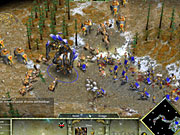
Shelley notes that sky passages cost several hundred resources to build--including a small amount of favor--and take time to construct, just like any other building. However, you can order more villagers to work on them to complete construction faster. Once you send units into one sky passage, they can immediately reappear at any other sky passage you own. You can also upgrade them to decrease their cost, increase their line of sight, and give them a ranged attack. However, each individual sky passage is just a single gateway, so, in order to make a two-way route, you must send villagers to your desired destination and build a second one. Although these structures will provide powerful tactical opportunities, they are also expensive and vulnerable to attack and destruction. They can be built immediately during the first (archaic) age.
The sky passage is really Oranos' unique and tangible god bonus, just like Gaia's lush and Kronos' time shift. But he has more traditional divine abilities as well.
The Powers of Oranos
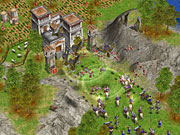
Oranos' god power is called shockwave. It is available in the first age, so, as you might expect, it isn't vastly powerful, but it does have its uses--especially since you can use it multiple times. Shelley explains, "Target a location on the map, and enemy units nearby will be sent flying--stunning them for a few seconds. Shockwave can slow down and disperse an enemy attack, giving you more time to gather a defense or target a key enemy unit or building." While shockwave does damage units, it doesn't deal nearly enough damage to kill units. What it's best for is delaying an enemy army or disrupting an attack force. The area of the shockwave is about the size of a palace building, so it can disrupt a good force of 10 to 12 units. You see them as they're flung into the air and then land--hard--as if head-butted by a minotaur. After a brief pause to pick themselves up and shake off the dirt, the affected units will then resume their attack.
Oranos has several other bonuses. His mythological improvement is safe passage, which is the upgrade previously mentioned for sky passages. He also starts the game with a line of sight to all neutral settlements in the game (though you don't automatically gain sight of enemy bases). That's a pretty significant advantage for an Atlantean player, since extra settlements equate to faster favor generation. This ability also gives you a good idea of where you can expand your holdings. Shelley also says that Oranos has one other, less noticeable advantage: "All human units of Oranos move a little bit faster than they do for other Atlantean gods." The increased speed isn't obvious, but it does provide Oranos' armies with a subtle advantage.
Several of these human units are built at the Atlantean palace and are unique to the Atlantean civilization. There are actually three new Atlantean units that can be built there, and they make for interesting additions to Age of Mythology, indeed. These three units are the heavy destroyer, the fanatic, and the fire siphon.
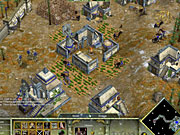
The heavy destroyer can be built in the third (heroic) age, which is also, coincidentally, when you can build the palace. The palace is analogous to the Norse hillfort and the other "fortress" buildings for the other factions. The destroyer is an anti-building infantry unit. While it wouldn't be your first choice for attacking enemy foot soldiers, it is great for demolishing buildings quickly--hence its name. In waves, they can raze a town in mere moments, but they need protection to withstand counterattacks from enemy troops.
The fanatic is a heavy infantry unit that you can build in the fourth age. It is extremely strong, and, in the fourth age, this unit will be the core of an Atlantean human army. It is excellent against cavalry and other infantry, but it's weak against ranged units, like throwing axemen and hypaspists. The final unique Atlantean unit at the palace is the fire siphon. This devastating machine can be built in the fourth age as well. It is a siege engine that is basically the mythological equivalent of a flamethrowing tank, and it's specifically designed to burn buildings to the ground.
While these mortal units will be a huge component of any Atlantean army, including Oranos,' as always, the mythological creatures and powers afforded by the minor gods will be the true determinant of victory or defeat in Age of Mythology: The Titans. Let's take a look at Oranos' choices.
Minor Gods
When Oranos players reach the second (classical) age, they're able to choose between the minor deities Oceanus and Prometheus. Prometheus, the titan ally of Zeus who was tortured for sharing fire with man, was already covered extensively in the Kronos showcase. Oceanus gives you two myth units, both of which give you the unique ability to heal your units, en masse, while on the battlefield. Bruce Shelley explains, "First is the servant, which is a sea myth unit. You cannot build it until you build a dock. It will attack enemy ships and has the second benefit of healing friendly units nearby, both at sea and on land. The second myth unit is the caladria, the flying healer. It has no attack. It can be used as a flying scout and will heal allied units also. It can be only attacked by ranged units."
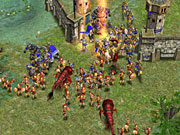
Oranos' god power is carnivore--stationary carnivorous plants that remain on the map until destroyed. According to Shelley, "You get to place these large carnivorous plants on the map, on land or in shallow water. They will attack human units that pass within range. Their special attack is picking up an enemy unit and dropping it into their mouths. Their normal attack is swiping units with their spiny vines. These units are [best] used defensively. They stay in place until killed and can be attacked by enemy units." Rounding out Oranos' repertoire are the myth technologies: bite of the shark, which improves the attack of the murillo unit (the sword infantry unit of the Atlanteans from the second age); and weightless mace, which increases the speed and attack of your katapeltes units--who are countercavalry troops.
In the heroic age, Oranos players may choose to ally with either Theia or Hyperion. Theia was covered in the Gaia showcase while Hyperion was discussed in the Kronos showcase preview. (Please refer to the previous articles for more information.)
In the final age, your choice of gods boils down to Hekate or Helios. Helios, the god of the sun, was revealed in the previous showcase on Kronos. Hekate, who was touched on just briefly in the first showcase, is a formidable goddess with some great powers. The mythological unit she provides--the lampades--is perhaps the strongest of all Atlantean myth units. Shelley explains, "They deal crushing damage at close range and piercing damage at a distance. Their special attack is a ranged attack that invokes 'chaos' in an enemy unit. [Any unit hit by this special attack becomes] the enemy of everyone and it immediately begins attacking the nearest unit. Since this attack hits at range, it is likely that the [affected] unit will attack one of your enemies." By having the lampades target enemy units who are located at the rear of enemy forces, you can ensure that some of your enemies' units will turn to attack each other on the battlefield. So the lampades is not only a strong attacker, but it can also effectively subvert an enemy army. Incidentally, "chaos" itself is a new unit condition in the expansion pack. Several units and gods in the game create chaos units--or they can afflict other units with this condition. Any player whose units are affected by this new condition loses control of them as they attack the nearest units in sight.
Hekate's god power is tartarian gate. Shelley states, "You can place this anywhere you have line of sight and where there is room. It opens a gate to the underworld from which aggressive creatures pour forth; these creatures are enemies to all. They look like demonic wolves. A good use of this power is to drop the gate inside an enemy town. If the gate is not destroyed, the creatures will kill all living things and all buildings within a decent-sized radius. The key to surviving the tartarian gate is to destroy the gate itself. So long as it stands, the creatures will continue to appear. It is best to concentrate on the gate first and then kill the creatures. This can wreck a town and can take a player out of a game. However, it's hard to find a place to put it in a crowded town, and it cannot be placed on Gaia's lush terrain, so it's more difficult to use it against her." While powerful, what keeps this god power in check is the fact that the demon wolves, created by the tartarian gate, are chaos units who will attack friend and foe alike.
Hekate's myth techs include asper blood, which turns the lampades' normal attack into an area attack; mythic rejuvenation, which gives all your myth units the ability to regenerate health slowly; and celerity, which makes your myth units train faster. She is indeed a powerful ally.
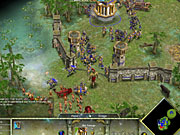
Now that Oranos' mighty retinue has been revealed, the Age of Mythology: The Titans showcase is finished. Fortunately, though the showcase is over, the game is just around the corner. In a few weeks, the expansion pack will finally be released, and you'll be able to try out all three of the new major gods yourself. Then you can pit Atlanteans against the former civilizations of Age of Mythology.
Got a news tip or want to contact us directly? Email news@gamespot.com
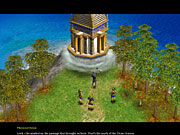
Join the conversation